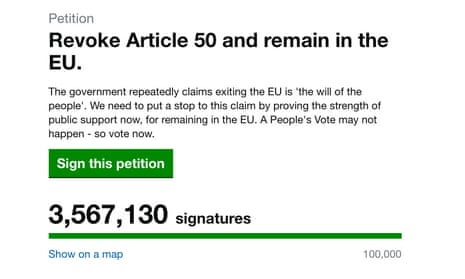An online petition calling on the UK government to revoke article 50 and remain in the EU has hit 3.5m signatures, adding 2.5m signees in less than 24 hours.
The petition, started in late February by “frustrated remainer” Margaret Georgiadou, began to rapidly gain signatures on Wednesday evening, following the prime minister’s appeal to the British people to back her in her standoff with MPs from all parties.
But Theresa May rejected the message of the petition, when a No 10 spokeswoman said on Thursday evening that she worried that cancelling Brexit would cause “potentially irreparable damage to public trust”.
“The prime minister has long been clear that failing to deliver on the referendum result would be a failure of our democracy and something she couldn’t countenance,” the spokeswoman added.
Over the course of Thursday, the parliamentary petitions website collapsed multiple times under the weight of traffic to the plea. The error message “Bad gateway”, which displayed when the website was struggling most, even trended on Twitter at times throughout the day.
In order to keep the petition site online as much as possible, several resource-intensive features were disabled, including a chart tracking the petitions with the highest uptake, and the signature count was slowed to update only every 30 minutes – leading some to worry that their signatures were not being counted.
Q&AWhat does the government do with online petitions?
Show
After 10,000 signatures, petitions get a response from the government. After 100,000 signatures, petitions are considered for debate in parliament.
Since the online petition service was launched, the government has responded to over 300 petitions, and 55 petitions have been debated in parliament.
The government has already responded to a previous petition about revoking Article 50 on 19 February 2019, stating: 'The government’s policy is not to revoke Article 50. Instead, we continue to work with parliament to deliver a deal that ensures we leave the European Union, as planned, on March 29th'.
This petition, which gained 148,912 signatures, was also debated in parliament on 11 March 2019.
Early on Friday afternoon, more than 1,000 viewers were logged on to livestreams of the website on the video game streaming service Twitch, enabling them watch the count update in real time without needing to worry about whether or not their visits might contribute to the site’s struggles.
As the petition attracted attention, conspiracy theories were traded from both sides of the EU divide. Some expressed fear that the site’s troubles were a plot to prevent further signatures, while others claimed that a small proportion of signatures from addresses listed as overseas – including one from “North Korea” – meant that the petition had been “hijacked by bots” and that “the vast majority of signatures were actually fake”.
In fact, 96% of the signatures are listed as from the UK. In a tweet, the House of Commons petitions committee also clarified that overseas signatures were valid, since “anyone who is a UK resident or a British citizen can sign a petition. This includes British citizens living overseas.”
Bristol West and Brighton Pavilion tie for the two most heavily remain constituencies in the country, according to the petition, with each boasting 6.89% of their electorate having signed it. At the other end of the scale, just 0.28% of voters in Birmingham Hodge Hill, Liam Byrne’s constituency, supported the call to revoke article 50.
